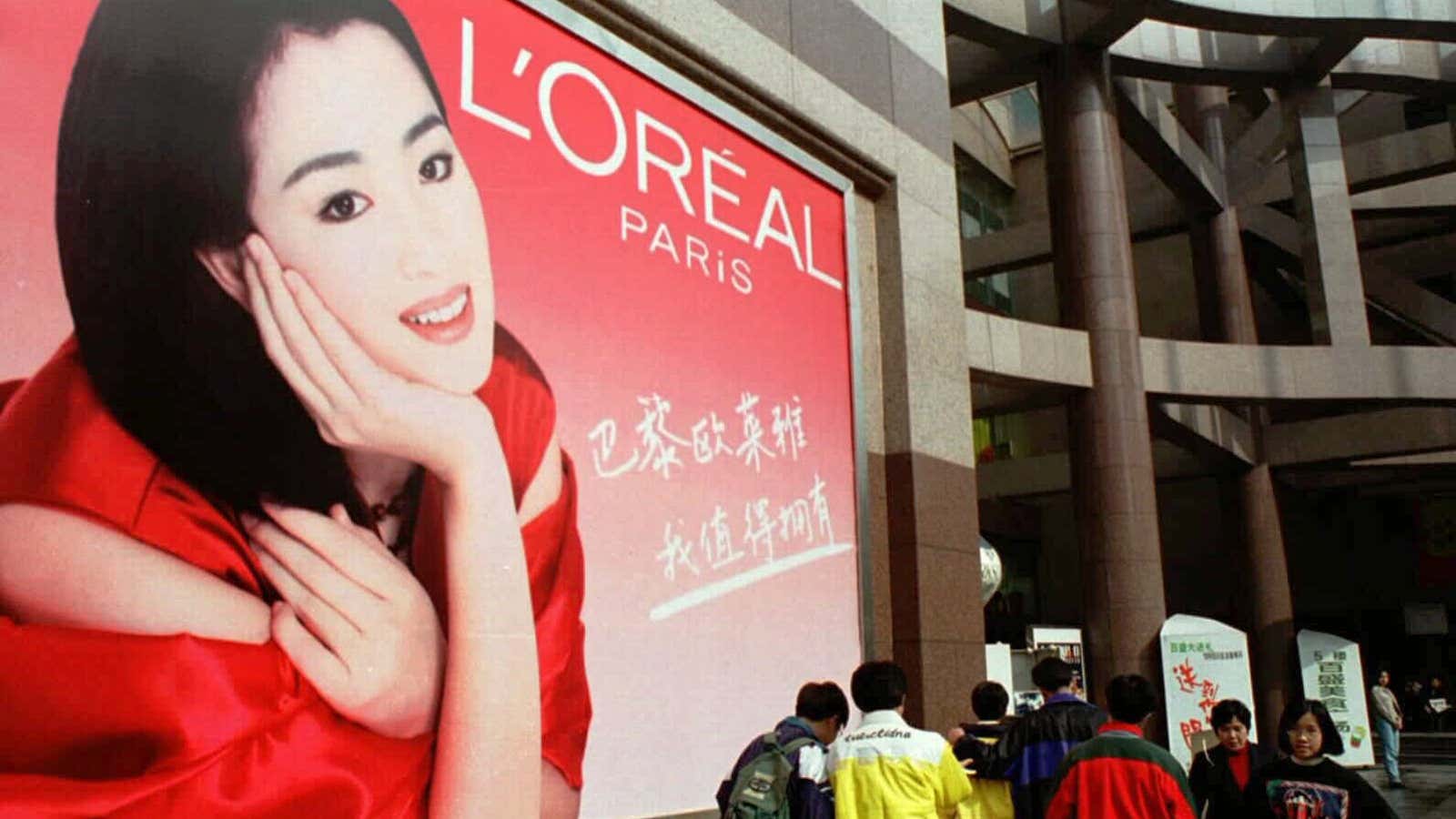In a victory for Chinese animal rights activists—as well as for an estimated 10,000 rabbits, guinea pigs, and mice—the Chinese government ended its mandatory animal testing for most cosmetic products on June 30. But for cosmetics companies manufacturing outside China who have made a point of forgoing animal testing, the news offers little reason to celebrate. The law only frees companies that manufacture domestically (pdf) from the requirement that they hand over samples to the government for animal tests—not foreign ones.
This leaves many major cosmetic companies in bit of a conundrum, as they try to sell makeup, lotions, shampoos and skin-lightening creams in China’s 162.5-billion-yuan ($26.3-billion) cosmetics sector—while maintaining their anti-cruelty stance in Western markets. Indeed, Avon, Estee Lauder, and Revlon were removed from the list of cruelty-free companies that People for the Ethical Treatment of Animals (PETA) maintains, after the animal rights group discovered that they were submitting to Chinese animal testing.
Here are some ways that a handful of big-name foreign companies operating in China have navigated the issue.
L’Oreal: One of the biggest cosmetic companies out there, L’Oreal has touted itself as an animal-testing-free brand. But the company has a caveat on its website: “In China, the regulatory authorities carry out within their evaluation centers animal tests for finished cosmetics products before these are placed on their market. We think these tests are unnecessary but we cannot prevent them.” The high-end brand Kiehl’s, whose parent company is L’Oreal, reiterates the policy of not testing on animals, but adds ”An exception could only be made if regulatory authorities demanded it for safety or regulatory purposes.”
Body Shop: Although its parent company is also L’Oreal, Body Shop has taken a stronger stand against China’s mandatory law on animal testing, perhaps because that stance is central to its brand image. The company had originally put stores in China’s airports, where products aren’t subject to the same animal testing required for general sales in China. But it removed its products from shelves after news that they may be subject to post-market testing, which can be done on animals.
Procter & Gamble: The largest cosmetics maker in the world, P&G is parent to brands that include Olay, SK-II, and CoverGirl. Its company website, like L’Oreal’s, says it is committed to pursuing an end to animal testing. More than 99% of P&G’s products haven’t been tested on animals, the site says, adding, “The remaining tiny percentage comes from studies required by law or because of legally obligated safety requirements where no alternatives are available yet.” Olay and SK-II are sold in China, and in 2005 CoverGirl was launched in China.
Estee Lauder: Parent company to Clinique and M.A.C., Estee Lauder is “committed to the elimination of animal testing,” according to the Clinique website. But again, it includes an “except when required by law” clause. Both Clinique and M.A.C. are sold in China.
L’Occitane: On its website, L’Occitane points out that it was one of the first on the British Union for the Abolition of Vivisection’s (BUAV) list of animal-test-free cosmetics. It also acknowledges, however, that BUAV took them off the list for operating in China. “Unfortunately given the limited economic and political weight of L’OCCITANE, ceasing to sell our products in China will not do anything to change local regulations,” the company concludes. “Instead, to move forward we decided to develop relationship with the Chinese authorities to pledge the case for the ending of animal testing for beauty products, through open dialog.”
Even though foreign firms still must submit their cosmetics for animal testing before selling them in China, the law’s amendment is a sign of a gradual policy easing. Humane Society International credited its own “Be Cruelty-Free China” campaign for prompting the move, and described it as a phase in an ongoing process, expressing a hope that “once the new system has been established, it may be expanded to include imported products and certain ‘special use’ cosmetics as well. This would be a major step towards removing trade barriers between China and the EU, enabling cruelty-free companies worldwide to sell their products on the Chinese mainland without compromising their ‘no animal testing’ policies.”
Until that happens, the discrepancy between the treatment of products manufactured in China and abroad offers Chinese cosmetics companies an advantage and “gives their own industry a boost,” said Dan Harris, an attorney at the international law firm Harris Moure, who specializes in China.
Meanwhile, smaller foreign companies that have built their brand and customer loyalty on an anti-testing stance may find themselves waiting on the sidelines of China’s booming cosmetics market.
